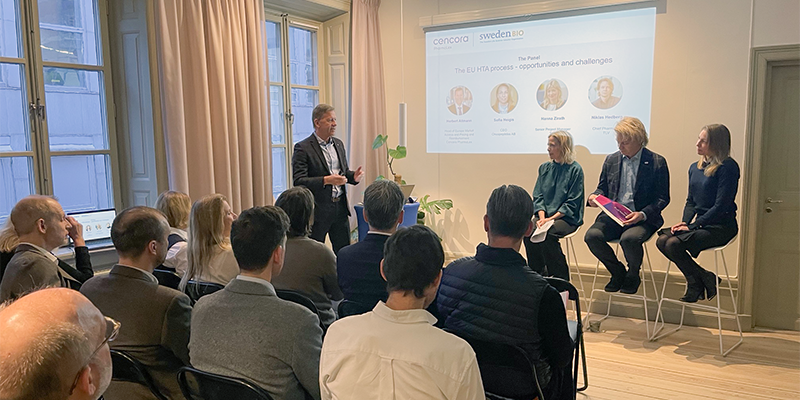On February 20th, SwedenBIO and Cencora PharmaLex organized a Brain & Breakfast event in Stockholm about the EU HTA process and challenges and opportunities for implementation in Sweden.
During a 60 minute discussion, participants delved into the current landscape of the Joint Clinical Assessment (JCA), both from a European and Swedish perspective, offering insights from both regulatory authorities and industry representatives, reported Ida Sjöberg, Director, Head of Market Access Nordics, and Anna-Karin Boström, Senior Manager, Health Economics & Outcomes Research, Cencora PharmaLex. Topics explored included the anticipation of national impacts, the harmonization of clinical and economic considerations, and the potential synergy between JCA and national assessment frameworks.
She emphasized the critical importance of understanding how JCA reports will inform TLV evaluations, particularly with regards to integrating value-based pricing considerations.”
Niklas Hedberg, representing TLV and serving as the co-chair of the HTAR Coordination group, provided invaluable insights into the overarching European perspective on the JCA process, shedding light on ongoing developments and future expectations, Sjöberg and Boström reported. In addition, Hanna Zirath, a senior project manager at TLV and representing Sweden in the HTAR Coordination group on all topics about medicinal products, offered a comprehensive view of the national processes in light of the JCA implementation, detailing Sweden’s role in shaping the regulatory framework. She emphasized the critical importance of understanding how JCA reports will inform TLV evaluations, particularly with regards to integrating value-based pricing considerations.

Herbert Altmann, PharmaLex/Cencora Head of Europe Market Access and Pricing and Reimbursement (moderator), Sofia Heigis, Oncopeptide AB, Niklas Hedberg, TLV, Hanna Zirath, TLV (panelists)
Sofia Heigis, CEO of Oncopeptides, shared her perspective on the implications of JCA for companies operating in Sweden and across Europe. Sofia underscored the prevailing uncertainty among companies and emphasized the necessity of acquiring knowledge, engaging with Market Access early in the development process, and fostering robust networks. She highlighted the pivotal role of organizations like SwedenBIO in raising awareness and supporting industry stakeholders.
Sjöberg and Boström summarized the key take aways from the event:
Prioritize Preparation
In order to be adequately prepared, pharma/biotech companies should familiarize themselves with the available information and materials continuously published by the EC and other competent experts. Preparation strategies revolve around understanding TLV’s usage of PICOs and early dialogue between companies and stakeholders. It’s crucial to stay abreast of updates and developments to effectively navigate the evolving landscape of the EU HTA process.
Emphasize Communication
Effective communication, interaction, and knowledge-sharing are pivotal both internally within organizations and externally between companies and regulatory authorities, especially during the implementation phase. Establishing clear channels of communication and fostering a collaborative environment will facilitate the exchange of vital information and insights, ensuring a smoother transition into the new regulatory framework.
Cross-functional collaboration
Implementing an integrated launch plan supported by research and development (R&D), market access, regulatory and other departments focusing on evidence generation for the new EU HTA process. Cross-functional collaboration fosters synergy and ensures alignment across various organizational functions, maximizing the efficiency and effectiveness of the evidence generation process.
Engage with Joint Scientific Consultation (JSC)
Engaging in early scientific consultation presents a valuable opportunity to consider an optimal and robust evidence generation plan satisfying both regulatory and HTA bodies’ requirements. By proactively engaging with all stakeholders, companies can tailor their evidence generation strategies to meet the evolving demands of the regulatory landscape.
PICO Considerations
The Joint Clinical Assessment (JCA) relies on the Population, Intervention, Comparator, and Outcome (PICO) framework for assessments. However, variations in healthcare systems and treatment guidelines among different nations will significantly influence how PICO criteria are applied in drug assessments. For example, high quality input from Swedish affiliates or SMEs is critical to ensure a good discussion with TLV in Sweden. It’s essential to consider these variations and tailor evidence generation strategies accordingly to optimize outcomes in different regulatory contexts.
Overall, the discussion provided valuable insights into the multifaceted challenges and opportunities presented by the JCA process, underscoring the importance of collaboration, transparency, and proactive engagement among all stakeholders involved, summarized Sjöberg and Boström.
What is the Joint Clinical Assessment (JCA)?
The EU Joint Clinical Assessment is a collaborative effort among EU member states to evaluate the clinical evidence of new treatments. The aim of the JCA is to enhance efficiency and consistency in decision-making regarding new health technologies across Europe by replacing individual country clinical assessments with a unified, transparent process.
When?
– Jan 2025 mandatory for all new oncology drugs and ATMP’s
– Jan 2028 mandatory for orphan drugs
– Jan 2030 all drugs registered with the EMA
Learn more here!
Photo: iStock








